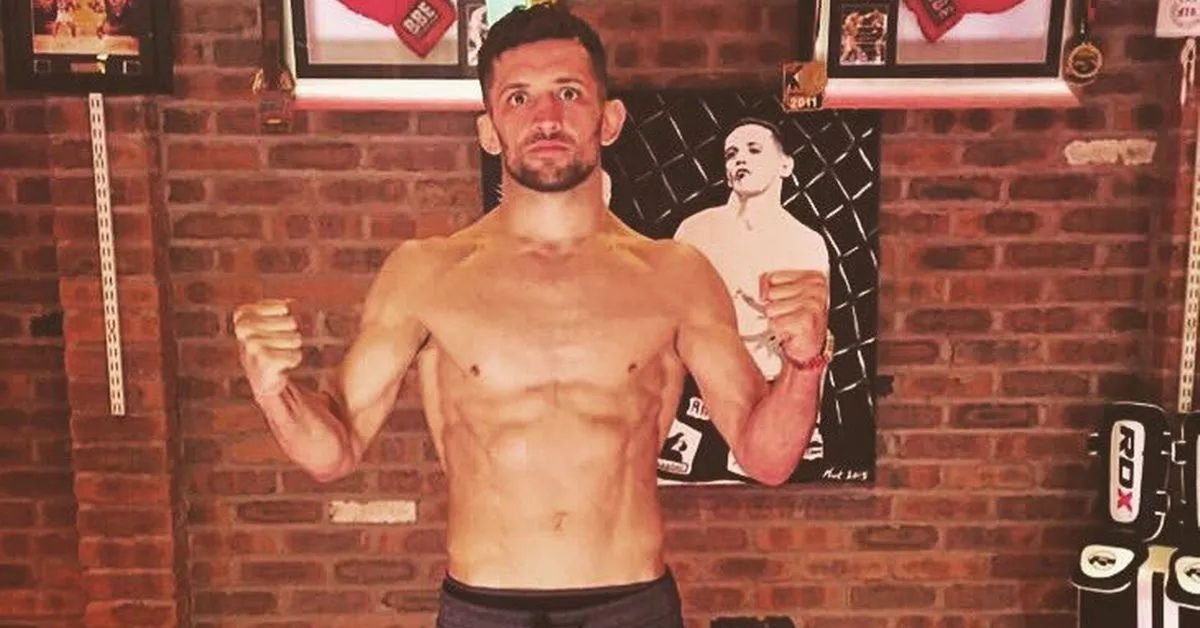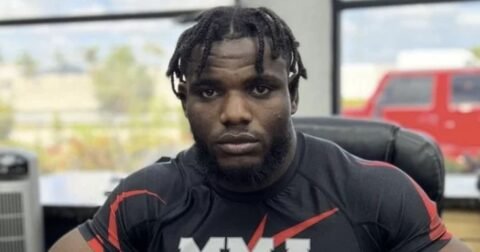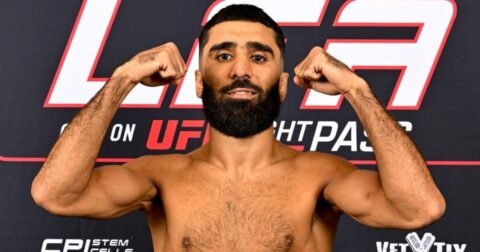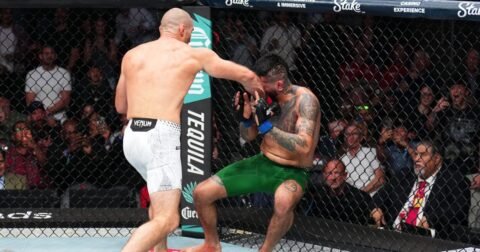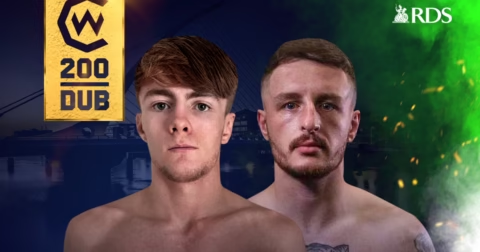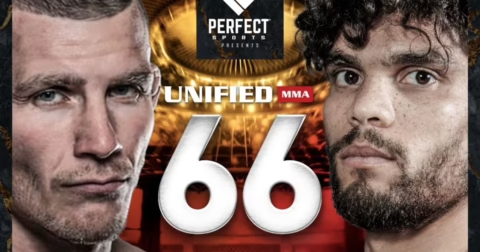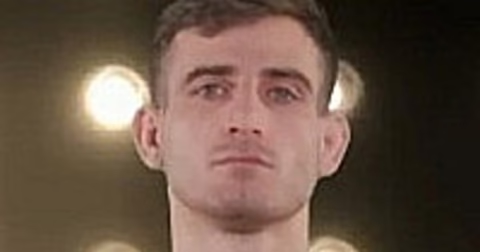Pietro Menga once stood at the pinnacle of potential in the MMA world, with his impressive record of 13 consecutive wins sparking interest from across the competitive landscape. Making his way through various promotions, he was hailed as a promising flyweight prospect, with aspirations that included an audition for The Ultimate Fighter. However, his journey took a drastic turn when he failed to make the required weight for his fight against Tim Elliott back in 2017, marking the beginning of a downward spiral that has ultimately led to his recent sentencing. His inability to secure a lasting foothold in the UFC created a series of setbacks, resulting in a four-fight losing streak that cast a shadow over his once bright career.
Menga’s story is not just one of professional failure; it has grimly turned into a tale centered around crime and legal consequences. The Greater Manchester Police recently sentenced him to 15 years and 5 months behind bars for serious offenses, including conspiracy to distribute prohibited firearms and drugs. This harsh sentencing repels the public from acknowledging the former fighter’s once-promising future, illustrating a dramatic contrast between his aspirations in the octagon and his involvement in organized crime.
This dramatically showcases the often-overlooked reality of professional athletes who slip away from their career paths into a life of crime. With Menga’s case, authorities have shed light on how drugs and firearms can entrap even those who have tasted success, especially in the high-stakes world of sports. As the MMA community observes this alarming development, questions arise about the influence of outside factors and personal choices that may lead fighters to make dangerous decisions. Menga’s situation serves as a sobering reminder of the potential fall that can follow fame, especially when fame leads directly into criminal enterprises.
The Impact of UFC Fighters Involved in Criminal Activities
The involvement of UFC fighters in criminal activities is not unprecedented, with past cases echoing similar narratives of promising careers becoming marred by illegal behavior. When high-profile athletes like Pietro Menga step into the judicial spotlight due to charges of drug trafficking and firearm possession, it not only jeopardizes their careers but also adversely affects the reputation of mixed martial arts as a whole. The public perception of these athletes is further tainted, leading fans and enthusiastic supporters to question the integrity and safety standards within the sport, especially with incidents involving organized crime and illegal activities gaining media coverage.
Moreover, this trend emphasizes the need for stricter regulations and support systems for athletes transitioning out of their fighting careers. Many MMA fighters face challenges in adapting to life outside the octagon, often leading them towards dangerous associations or criminal activity for quick financial gains. The UFC and similar organizations can work towards providing counseling and rehabilitation services to help their fighters avoid succumbing to these pressures.
In addition to the detrimental effects on the fighters involved, the repercussions extend to their communities, particularly when organized crime is at play. As Menga’s recent arrest falls within a larger narrative of Manchester crime news, it highlights the grim reality of urban areas grappling with drug-related violence and trafficking. The engagement of former sports elite in these illegal acts can aggravate existing safety concerns within neighborhoods, breeding distrust and fear. As cases like Menga’s emerge, the need for law enforcement to scrutinize professional athletes’ activities and associations becomes not only necessary, but urgent.
The Dangerous Intersection of Sports and Organized Crime
Pietro Menga’s involvement in organized crime illustrates a dangerous intersection between professional sports and illicit activities. With the allure of quick profits in drug trafficking and firearms dealing, many athletes may fall prey to the temptation of organized crime, especially after facing setbacks in their sporting careers. This alarming trend raises critical questions about the systemic issues surrounding the pressures athletes face and the vulnerabilities they may exploit when in pursuit of monetary support during times of hardship. Menga, who was reportedly a middleman in one of the UK’s most prominent firearm trafficking rings, represents just one of many examples of how easily the lines between sport and crime can blur.
Moreover, this phenomenon is exacerbated by social and economic influences that often lead athletes, especially those from struggling backgrounds, towards these unlawful avenues. The financial strain of maintaining a desired lifestyle, coupled with the inability to secure stable employment post-career, makes such illicit paths increasingly appealing. Discussions around this troubling issue must extend beyond individual accountability to address the larger environment contributing to these decisions, including inadequate support systems for athletes facing career transitions and a lack of community resources for individuals slipping into crime.
The Aftermath of Pietro Menga’s Arrest: Implications for Mixed Martial Arts
In the aftermath of Pietro Menga’s arrest, the ramifications for the mixed martial arts community are already palpable. As authorities delve deeper into the organized crime ring Menga is connected to, the potential fallout could instigate broader discussions regarding the scrutiny of fighters and their off-cage behaviors. The MMA world, needing to protect its reputation amid such scandals, faces a challenging task to engage in damage control while ensuring that the integrity of the sport remains intact. Just as the case of Menga disrupts the narratives of accomplishment and redemption in MMA, it demands an exposition of the underlying issues affecting fighters.
Furthermore, MMA organizations, including the UFC, may need to reaffirm their commitment to combatting the influence of drugs and firearms within the sport. Setting up educational initiatives and dedicated programs that focus on crime prevention and athlete support can play a significant role in protecting future generations of fighters. Addressing the psychological and financial challenges that could lead athletes down a criminal path is essential for safeguarding not just individual fighters but also the respect and seriousness of mixed martial arts as a legitimate sport.
Legal Consequences for MMA Fighters Engaging in Criminal Activities
MMA fighters like Pietro Menga represent a growing concern among regulators and fans alike regarding the legal consequences associated with engaging in criminal activities. The notable prison sentence served to Menga, tied closely to serious crimes such as conspiracy to sell drugs and firearms, sends a clear message that athletes involved in illegal activities will face severe repercussions. The legal framework surrounding these issues is often complicated, and as the MMA community watches Menga’s situation unfold, it may prompt further discussions on the justice system’s approach to handling similar cases of notable athletes entangled in criminal behavior.
These legal ramifications extend beyond the individual fighters to impact their teams, sponsors, and the broader sports community. When a fighter like Menga enters into organized crime, it places not only their personal reputation at risk but also that of any sponsors and associations linked to them. As public trust dwindles in the integrity of the sport, organizations must confront their role in promoting fighters with a history of questionable behavior while implementing more rigorous vetting processes. Overall, the increasing legal scrutiny around athletes involved in crime will continue to shape the narrative around MMA and its emerging fighters.
Exploring the Role of Social Media in Menga’s Criminal Activities
The role of social media and encrypted messaging platforms in facilitating illegal activities cannot be understated in Pietro Menga’s case. The detectives of Greater Manchester’s Serious Organized Crime Group uncovered messages revealing Menga’s overt discussions about drug trafficking and firearm transactions. This highlights a concerning trend within the realm of professional sports, where fighters may utilize modern communication tools to arrange illicit deals. As society increasingly moves toward digital communication, understanding how these platforms can both assist and hinder criminal activity becomes vital in the fight against organized crime.
More significantly, the incident serves as a wake-up call for regulating and monitoring the online activities of professional athletes. Anonymity and encryption can embolden individuals to engage in discussions about illegal activities without fear of immediate repercussion. With the digital age offering a veil of protection, it’s crucial for MMA organizations to introduce educational campaigns that inform fighters about the dangers posed by sharing sensitive information online, particularly concerning drugs and firearms. The effectiveness of such education could prove invaluable in deterring athletes from similar paths as Menga’s.
Impact of Mental Health on Fighters Post-Career
The challenges surrounding mental health for athletes transitioning out of their sporting careers are significantly highlighted by Pietro Menga’s arrest, particularly in relation to organized crime and substance abuse. Fighters often deal with immense pressure during their careers, which, if left unaddressed post-retirement, can lead to unhealthy coping mechanisms. The high-profile nature of MMA renders fighters like Menga vulnerable to the stresses associated with maintaining their public persona while grappling with post-fight realities, potentially steering them towards illegal activities for relief.
By addressing mental health openly, the MMA community could implement robust resources that provide psychological support and counseling for transitioning athletes. This can help mitigate the isolation and despair that often accompany retirement from competitive sports. Such interventions could reduce the risk of falling into crime, as continued mental health support might empower fighters to explore healthier paths and reintegrate into society more seamlessly.
Community Responses to Menga’s Criminal Activities
Pietro Menga’s arrest serves as a significant catalyst for community responses regarding the presence of crime in sports. The Manchester community, having witnessed the rise and fall of a local athlete, is grappling with mixed reactions toward Menga’s actions. While there are sentiments of disappointment, many community members also express understanding towards the complex circumstances that can drive individuals to crime. This creates an opportunity for crucial conversations around support systems for athletes and the societal factors that may influence their decisions.
Furthermore, local organizations and stakeholders may feel compelled to rally around the community to advocate for prevention measures. Discussions around youth involvement in sports, mentorship opportunities, and awareness programs can steer aspiring athletes away from the potential pitfalls of crime and substance abuse. As the dust settles on Menga’s case, it is imperative for communities to learn from this incident, ensuring that continued support and guidance is available to foster a healthier environment for future athletes.
| Key Point | Details |
|---|---|
| Sentence Duration | 15 years and 5 months in prison for conspiracy to sell prohibited weapons and supply cocaine. |
| MMA Background | Once a top flyweight prospect with 13 consecutive wins, Menga’s UFC career was marked by a failed weight cut and subsequent release after losing a series of fights. |
| Recent Activities | Scheduled to fight Kiru Sahota in 2024, but was arrested on January 15, 2023, after a police raid. |
| Criminal Investigation | Under investigation by the Greater Manchester authorities; involved in an organized crime group linked to large firearm trafficking. |
| Financial Trafficking | Conversation records revealed over $500,000 worth of drugs and firearms discussions. |
Summary
Pietro Menga’s recent sentencing is a significant turn in the life of the once-promising MMA fighter. After a career characterized by exceptional talent and a sharp rise in the ranks, his involvement in serious criminal activities has overshadowed his sports achievements. Menga’s actions not only led to his incarceration but also exemplify the darker side of combat sports where promising athletes can spiral into illegal activities. This case serves as a cautionary tale in the MMA community.

